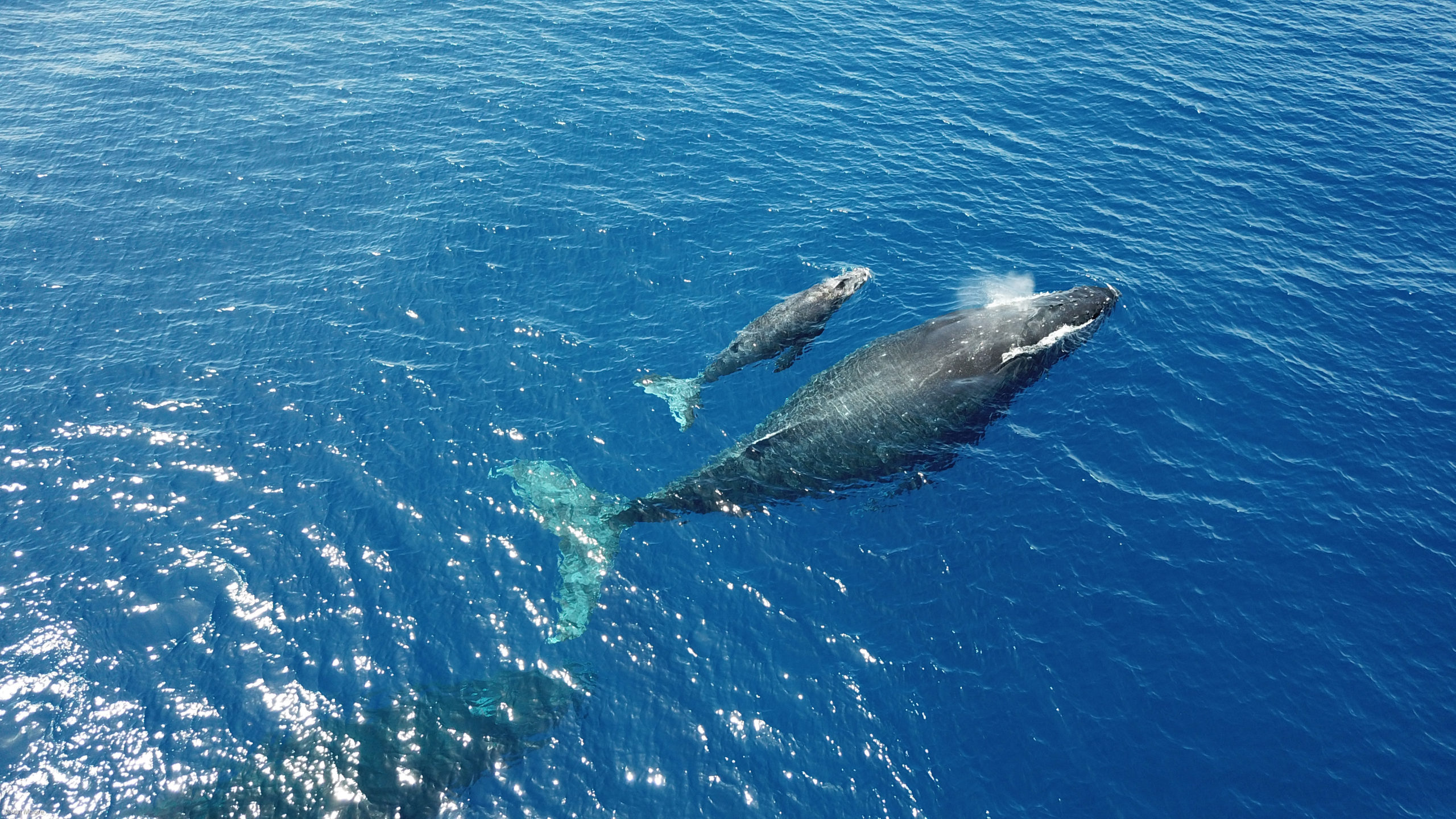
Silver Spring, Md. – October 12, 2021 – The National Marine Sanctuary Foundation awarded four mini-grants to support humpback whale research conducted within Hawaiian Islands Humpback Whale National Marine Sanctuary for the Fall 2021-Spring 2022 humpback whale season.
The four grantees were each awarded $5,000 to fund their projects. Grant recipients include the Hawai’i Marine Mammal Consortium, the University of Hawaii at Manoa- Hawaii Institute of Marine Biology, the Pack Marine Mammal Laboratory of the University of Hawaii at Hilo, and the Whale Trust (University of California-Santa Cruz). These grants will support ongoing research and conservation efforts to protect humpback whales and their habitat in the sanctuary, including monitoring population abundance, distribution and trends, behavior, and overall health.
Hawaiian Islands Humpback Whale National Marine Sanctuary protects these iconic species and their habitats. More than half of the North Pacific humpback whale population utilizes the shallow, warm waters of the main Hawaiian Islands as their principal breeding and calving wintering ground. The population of humpback whales in the North Pacific has rebounded since the end of commercial whaling in the 20th century and the increased focus on whale conservation. While the humpback whale population has been recovering, it is still susceptible to natural and anthropogenic threats and requires continued monitoring, research, and protection. Humpback whales serve as a sentinel species that reflects changes in the health of ocean ecosystems.
Hawaiian Islands Humpback Whale National Marine Sanctuary is hosting a virtual research symposium in November 2021 as part of the Ho‘i Koholā: Return of the Humpback Whale Month events. The grant recipients will be presenting an overview of their projects and the broader impact of their research.
The Hawai’i Marine Mammal Consortium’s project is titled “Monitoring Long-Term Distribution and Abundance Trends in Humpback Whales off the Kohala Coast of Hawai’i Island.” The Kohala Coast is of particular interest because it has not seen a level of recovery of the whale population after 2016 like the other islands have reported. The objectives of this study are to continue adding to the Consortium’s long time series dataset on the relative distribution and abundance of humpback whales and update existing analytical approaches with new data. The team intends to install a seafloor-mounted recorder to collect acoustic data and will compare the relative metrics of abundance gathered from the visual and acoustic surveys. The team hopes that this research may offer a potential path to connect data from Hawai’i Island with acoustic data collected around other islands.
The Marine Mammal Research Program at the Hawaii Institute of Marine Biology at the University of Hawaii at Manoa’s project is titled “Using Aerial Photogrammetry to Quantify Humpback Whale Energetics and Health Status Across Their Hawaiian Breeding and Southeast Alaskan Foraging Grounds.” Aerial photogrammetry via unoccupied aerial systems (drones) and biopsy-derived adipose analyses will be used to quantify the body condition and overall health and energetics of humpback whales in both their breeding and feeding grounds. Quantifying and monitoring the health status of these populations provide a valuable means of tracking and documenting the long-term health of marine ecosystems in the face of climate change and anthropogenic stressors.
The University of Hawaii at Hilo’s Pack Marine Mammal Laboratory project is titled “Assessing Stress in Humpback Whale Mothers Early and Late in the Breeding Season in Maui Waters by Comparing Blubber Cortisol and Corticosterone Concentrations to Body Condition Health Measures.” As humpback whale calves are dependent on their mothers during their first year of life, a healthy mother whale is essential for ensuring the success of these calves, who will someday become part of the breeding population. Steroid hormones are increasingly used as a health biomarker. The collection of blubber for stress hormone biomarker analysis was rated at a 2019 NOAA meeting of humpback whale researchers as a priority knowledge gap. The University of Hawaii at Hilo’s project will address this gap by examining stress hormone biomarker concentrations, in conjunction with unmanned aerial system photogrammetry, in humpback whale mothers during the early and late season in the Hawaiian breeding grounds.
Whale Trust and the University of California-Santa Cruz, will be “Assessing Female Humpback Whale Reproductive Status, Condition and Behavior in Hawai’i.” This field study will build on existing research conducted by Whale Trust to determine how steroid and stress hormones influence the reproductive biology and mating system of humpback whales in the Central North Pacific. To accomplish this, the team will assess differences in the accumulation of steroid and stress hormones in humpback whales and cross-validate this with morphometric measurements and known sighting histories of sampled individuals. The team hopes to determine if early pregnancy and estrus can be measured in humpback whales in their winter breeding grounds, and correlate hormone levels with reproductive behavior.
###
The National Marine Sanctuary Foundation, established in 2000, is the official non-profit partner of the National Marine Sanctuary System. The Foundation directly supports America’s national marine sanctuaries through our mission to protect species, conserve ecosystems and preserve cultural and maritime heritage. We accomplish our mission through community stewardship and engagement programs, on-the-water conservation projects, public education and outreach programs, and scientific research and exploration. The Foundation fosters innovative projects that are solution-oriented, scalable and transferable, and develop strategic partnerships that promote the conservation and recovery of species and their habitats. Learn more at marinesanctuary.org.
Contact: Chip Weiskotten
Director of Strategic Communications
518-669-3936
chip@marinesanctuary.org
